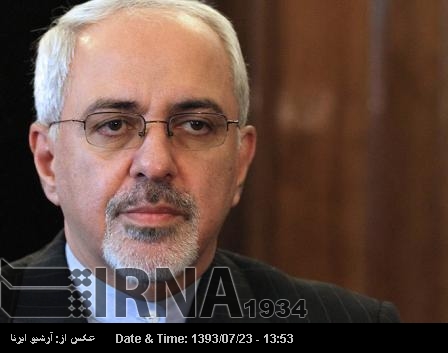Iran's nuclear technology is indigenous and peaceful and an achievement made by Iranian scientists. No one can wish such achievement should not exist, Zarif told reporters following his meeting with the outgoing EU foreign policy chief Catherine Ashton.
The Iranian FM said that in his negotiations with Ashton, the two discussed remaining issues and ways to solve the disputed topics.
It is necessary to talk about the ways which are both serious and innovative for resolving the remaining disagreements, Zarif said noting, but it is a time-consuming discussion and we may need more time for further negotiation.
Noting that during their talks on Tuesday, the two sides failed to reach a conclusion about the discussed issues, Zarif stressed, however, there is a political intention to reach that conclusion.
Zarif added that nuclear meetings will continue as of Wednesday afternoon in the form of tripartite talks with the participation of Ashton and US Secretary of State John Kerry.
Another meeting will be held on Thursday by political directors of the Group 5+1, Zarif added.
He said the meeting with the G5+1 will be held upon Iran's demand as Tehran believes presence of all sides in the meeting is necessary for reaching a final solution.
Zarif reiterated Tehran's policy on the nuclear issue saying that according to the Islamic teachings and policies outlined by Supreme Leader of the Islamic Revolution Ayatollah Ali Khamenei possession of any kind of weapons of mass destruction is religiously forbidden.
Iran has no need to nuclear arms, Zarif stressed.
He said the Thursday meeting can be an opportunity to review all issues with members of the G5+1 (US, Britain, Russia, China and France plus Germany). But this does not necessarily mean that there is a new positive or negative situation, added the head of the Iranian nuclear negotiating team.
We won't have a deal when we have not reached an agreement on all issues, Zarif stressed.
More than 40 days are left to the end of a deadline set for the nuclear talks, he added.
During their talks held in Austria in July focusing on drafting a comprehensive agreement between the two sides, Iran and six world powers agreed to a four-month extension of negotiations to reach a comprehensive long-term nuclear deal.
The extended deadline will expire on November 24.
Solutions have been introduced for all issues by different parties of the talks, Zarif said noting, the only thing remaining is to reach a conclusion about those solutions as one single package.
Tehran and the G5+1 wrapped up their latest round of nuclear discussions in New York late September.
Iran and its negotiating partners are currently working to reach a final agreement aimed at ending the longstanding dispute over Tehran’s civilian nuclear activities as the November 24 deadline approaches.
Last November, the two sides clinched an interim nuclear accord, which took effect on January 20 and expired six months later. However, they agreed to extend their talks until November 24, as they remained split on a number of key issues.
1394**1377

Tehran, Oct 15, IRNA – Foreign Minister Mohammad Javad Zarif said in Austria on Wednesday that everyone has currently reached the conclusion that the nuclear issue can be settled.

